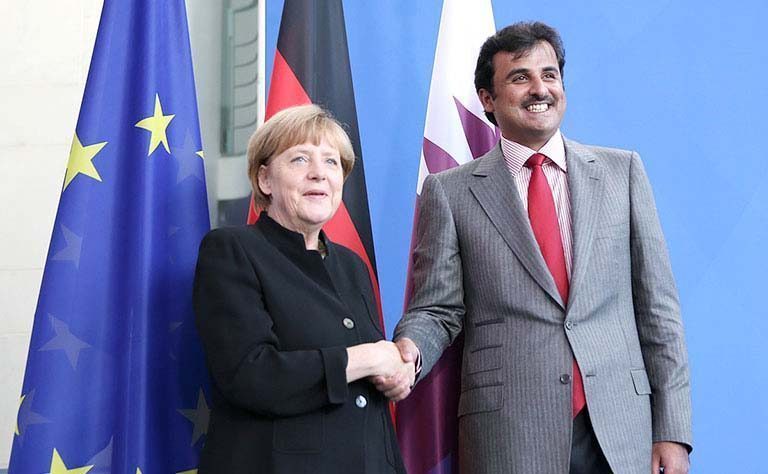
In some of his first public remarks about labor rights in Qatar, the nation’s Emir has admitted that there have been “errors and problems,” but that authorities were “working seriously on improving the situation.”
Sheikh Tamim bin Hamad Al Thani made the remarks during his official three-day visit to Germany, after being pressed on the matter by German Chancellor Angela Merkel, whom he met with for the first time.
Since being awarded hosting rights to the 2022 World Cup, Qatar has been facing intense international pressure to improve working and living conditions for its expats.
Numerous reports have documented human rights abuses particularly against blue-collar workers.

In May, Qatar authorities pledged to reform the restrictive sponsorship (kafala) system, and months later, Qatar’s Labor Minister Dr. Abdullah Saleh Al Khulaifi promised to implement proposed changes “as quickly as possible.”
But another senior official said last month that changes would not be enacted until at least until year-end or next year.
The reforms would make it easier for expats to switch employers and leave the country, but many rights groups have said they don’t go far enough to improve conditions here.
Some Qatari business leaders have argued the opposite, resisting the changes for being too drastic.
Still, critics of the current system hope that the Emir’s latest comments would help to speed up the process of change, particularly as Qatar increases its labor force to complete the many infrastructure projects ahead of 2022.
Pledge for change
During a joint press conference held by the Emir and Merkel this week, the German Chancellor was reported as having said: “I made very clear that we hope that especially in a country that is among the rich countries of the world, the labor conditions are good for guest workers.”
The Emir responded by saying that “there have been errors and problems, and we don’t say we are an ideal state that makes no mistakes.” He continued:
“But I think the good news is that we have tackled a lot and have initiated many changes in relation to the situation of foreign workers and we are working seriously on improving this situation.”
Though changes to the labor law are still pending, Qatar’s Ministry of Labor and Social Affairs (MOLSA) has already introduced a number of measures to improve problems.
This includes increasing the number of spot checks on labor accomodations, and closing down ones that flout the law. MOLSA has also announced that it would publicly name and shame recruitment agents who repeatedly break the labor law.
While it is illegal in Qatar to charge workers recruitment fees, many expats have fallen into deep debt due to this ongoing practice.
A recently-published report by Qatar Foundation into the hiring practices of semi and unskilled workers described a system of “endemic corruption,” resulting in trafficking, debt bondage and forced labor.
Another effort in the works is a requirement that companies pay their employees by direct deposit, to ensure that blue-collar workers are paid on time. The Cabinet approved a draft law to this effect in July, but no further movement appears to have been made on the legislation since then.
No terror support
At the same press conference with Merkel, the Emir also reiterated that Qatar does not support extreme Islamist groups. He said:
“What is happening in Iraq and Syria is extremism, and those groupings are being partially funded from abroad, but Qatar has never and will never support terrorist organizations,” he said.
His statement comes just weeks after Germany’s Development Aid minister Gerd Muller suggested that Qatar financed groups such as the so-called Islamic State. Berlin later apologized for the comment, and Merkel said she had “no reason to doubt the Emir’s statements.”
Thoughts?








